Analysis of Business Law Principles: A Report for LAW011-1 Students
VerifiedAdded on 2023/06/10
|12
|3798
|484
Report
AI Summary
This report provides an in-depth analysis of business law, focusing on contract law and company law principles. The report begins with an introduction to business law, emphasizing its role in protecting rights, maintaining order, and resolving disputes. Part 1 examines the UK contract law, addressing the existence of contractual relations in a case study, particularly the liability of a company for compensation. It discusses essential elements of a contract, such as offer, acceptance, and consideration. Part 2 delves into company law, exploring the concept of a company as a separate legal entity distinct from its shareholders, while also discussing exceptions to this principle, such as when the corporate veil is lifted. The report also discusses cases like Salmon v. Salmon and the application of the corporate veil. The report includes a discussion on the case of Foss v Harbottle. The report concludes with an analysis of the implications of these legal principles and case studies in a business context.
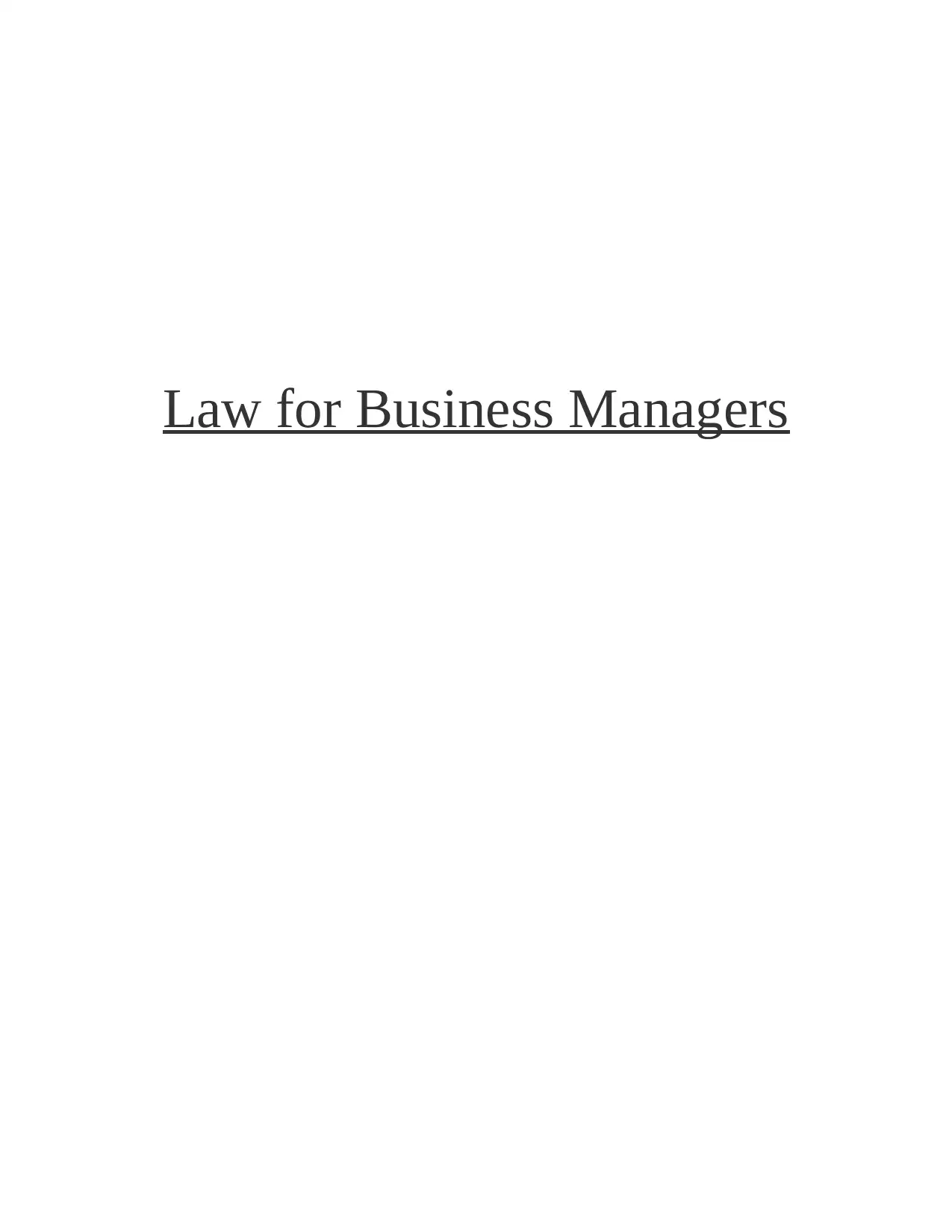
Law for Business Managers
Paraphrase This Document
Need a fresh take? Get an instant paraphrase of this document with our AI Paraphraser
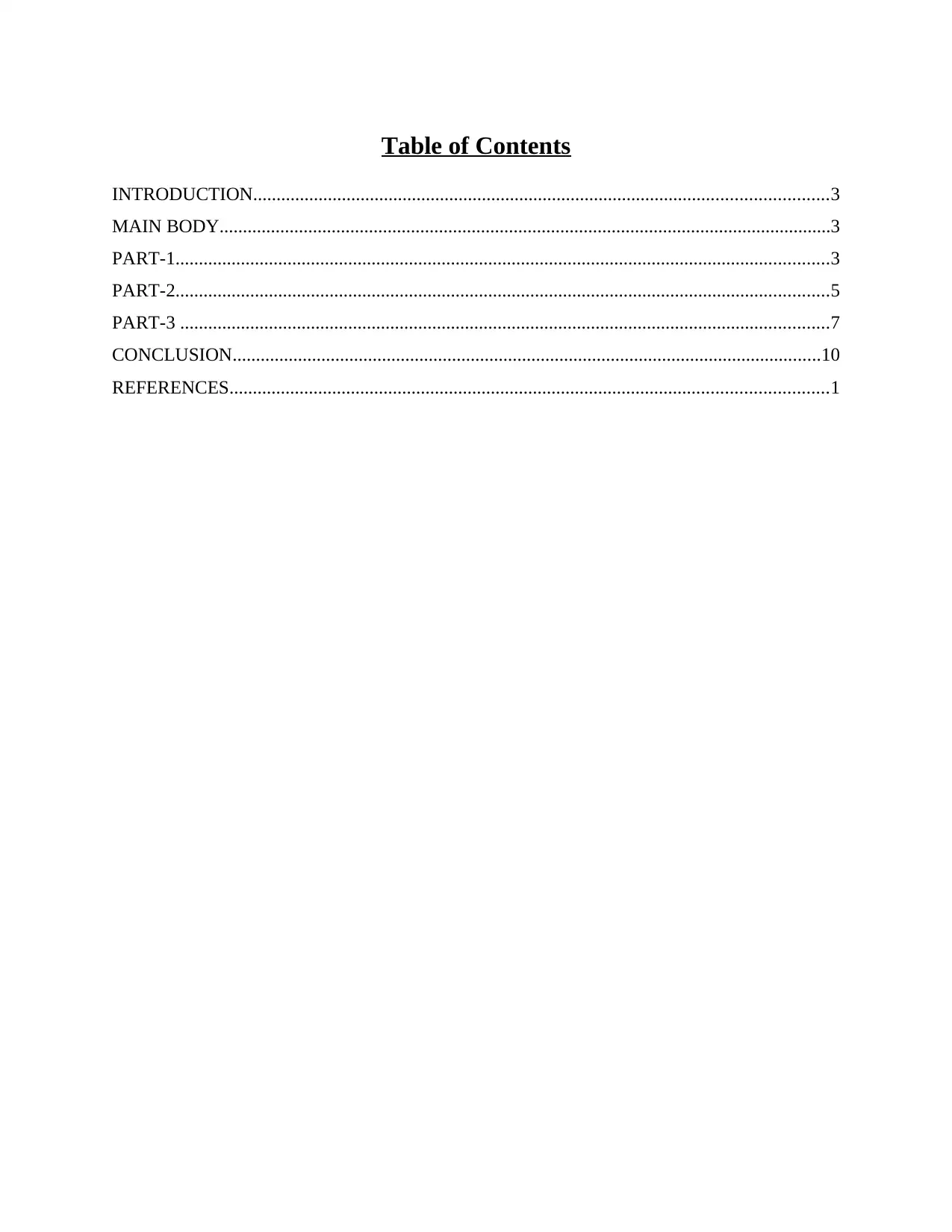
Table of Contents
INTRODUCTION...........................................................................................................................3
MAIN BODY...................................................................................................................................3
PART-1............................................................................................................................................3
PART-2............................................................................................................................................5
PART-3 ...........................................................................................................................................7
CONCLUSION..............................................................................................................................10
REFERENCES................................................................................................................................1
INTRODUCTION...........................................................................................................................3
MAIN BODY...................................................................................................................................3
PART-1............................................................................................................................................3
PART-2............................................................................................................................................5
PART-3 ...........................................................................................................................................7
CONCLUSION..............................................................................................................................10
REFERENCES................................................................................................................................1
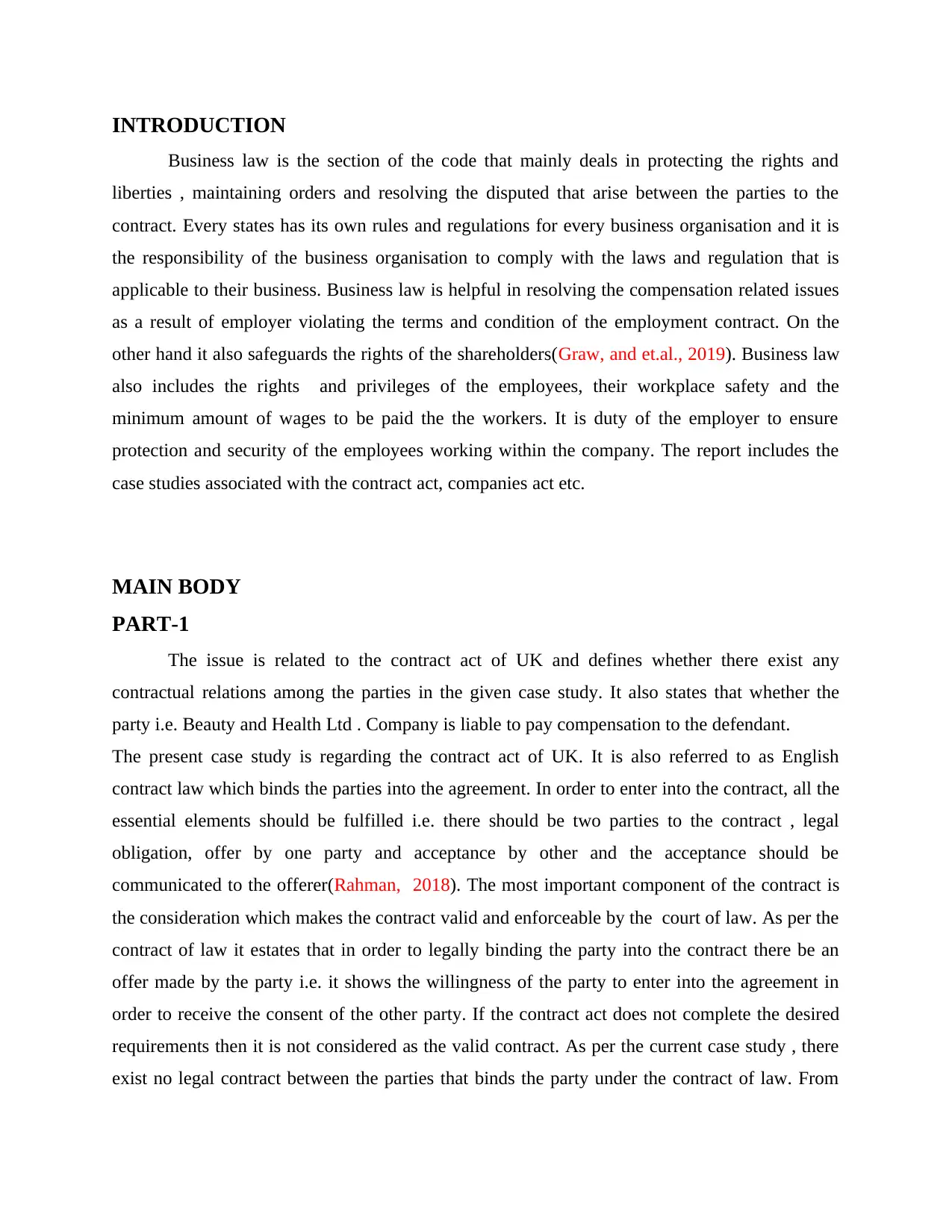
INTRODUCTION
Business law is the section of the code that mainly deals in protecting the rights and
liberties , maintaining orders and resolving the disputed that arise between the parties to the
contract. Every states has its own rules and regulations for every business organisation and it is
the responsibility of the business organisation to comply with the laws and regulation that is
applicable to their business. Business law is helpful in resolving the compensation related issues
as a result of employer violating the terms and condition of the employment contract. On the
other hand it also safeguards the rights of the shareholders(Graw, and et.al., 2019). Business law
also includes the rights and privileges of the employees, their workplace safety and the
minimum amount of wages to be paid the the workers. It is duty of the employer to ensure
protection and security of the employees working within the company. The report includes the
case studies associated with the contract act, companies act etc.
MAIN BODY
PART-1
The issue is related to the contract act of UK and defines whether there exist any
contractual relations among the parties in the given case study. It also states that whether the
party i.e. Beauty and Health Ltd . Company is liable to pay compensation to the defendant.
The present case study is regarding the contract act of UK. It is also referred to as English
contract law which binds the parties into the agreement. In order to enter into the contract, all the
essential elements should be fulfilled i.e. there should be two parties to the contract , legal
obligation, offer by one party and acceptance by other and the acceptance should be
communicated to the offerer(Rahman, 2018). The most important component of the contract is
the consideration which makes the contract valid and enforceable by the court of law. As per the
contract of law it estates that in order to legally binding the party into the contract there be an
offer made by the party i.e. it shows the willingness of the party to enter into the agreement in
order to receive the consent of the other party. If the contract act does not complete the desired
requirements then it is not considered as the valid contract. As per the current case study , there
exist no legal contract between the parties that binds the party under the contract of law. From
Business law is the section of the code that mainly deals in protecting the rights and
liberties , maintaining orders and resolving the disputed that arise between the parties to the
contract. Every states has its own rules and regulations for every business organisation and it is
the responsibility of the business organisation to comply with the laws and regulation that is
applicable to their business. Business law is helpful in resolving the compensation related issues
as a result of employer violating the terms and condition of the employment contract. On the
other hand it also safeguards the rights of the shareholders(Graw, and et.al., 2019). Business law
also includes the rights and privileges of the employees, their workplace safety and the
minimum amount of wages to be paid the the workers. It is duty of the employer to ensure
protection and security of the employees working within the company. The report includes the
case studies associated with the contract act, companies act etc.
MAIN BODY
PART-1
The issue is related to the contract act of UK and defines whether there exist any
contractual relations among the parties in the given case study. It also states that whether the
party i.e. Beauty and Health Ltd . Company is liable to pay compensation to the defendant.
The present case study is regarding the contract act of UK. It is also referred to as English
contract law which binds the parties into the agreement. In order to enter into the contract, all the
essential elements should be fulfilled i.e. there should be two parties to the contract , legal
obligation, offer by one party and acceptance by other and the acceptance should be
communicated to the offerer(Rahman, 2018). The most important component of the contract is
the consideration which makes the contract valid and enforceable by the court of law. As per the
contract of law it estates that in order to legally binding the party into the contract there be an
offer made by the party i.e. it shows the willingness of the party to enter into the agreement in
order to receive the consent of the other party. If the contract act does not complete the desired
requirements then it is not considered as the valid contract. As per the current case study , there
exist no legal contract between the parties that binds the party under the contract of law. From
⊘ This is a preview!⊘
Do you want full access?
Subscribe today to unlock all pages.

Trusted by 1+ million students worldwide
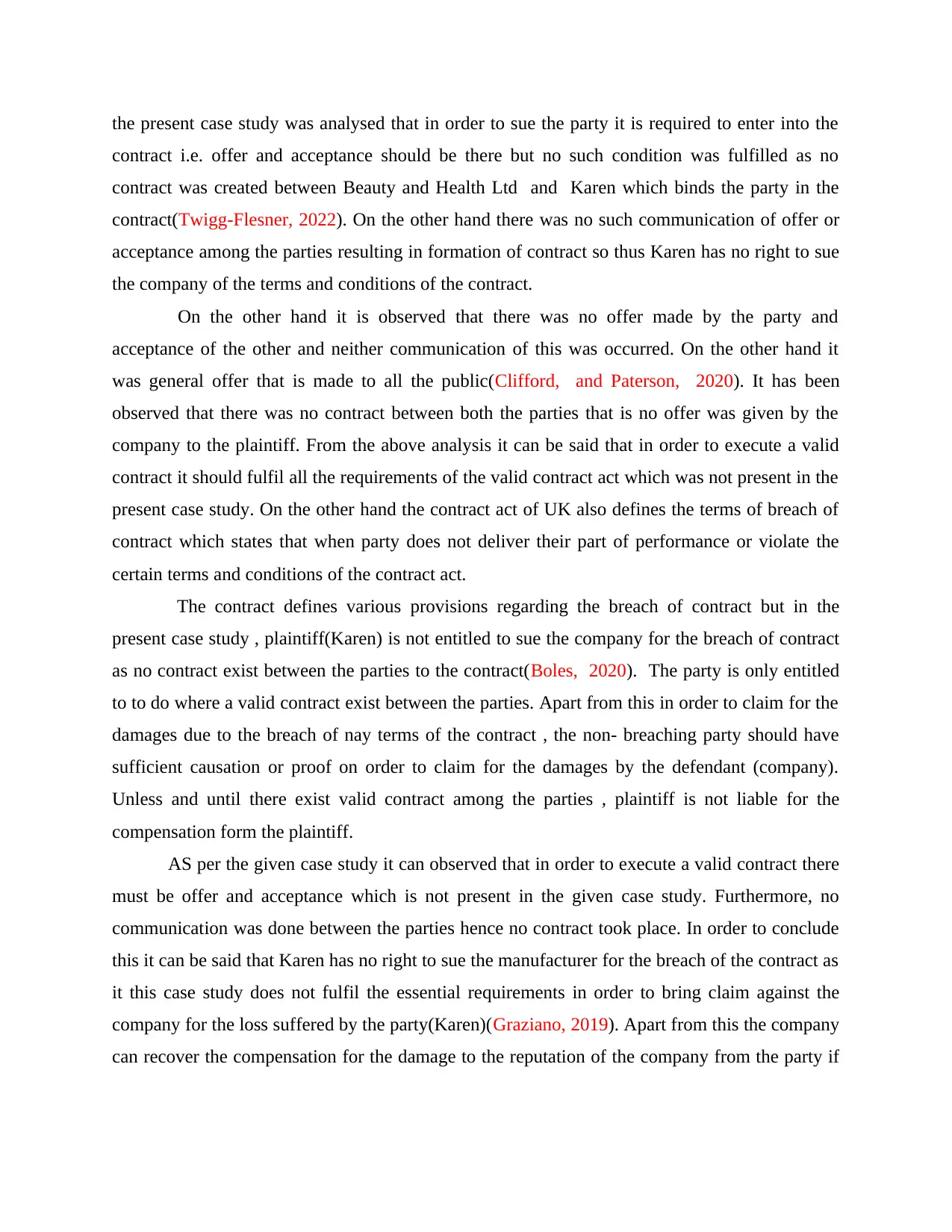
the present case study was analysed that in order to sue the party it is required to enter into the
contract i.e. offer and acceptance should be there but no such condition was fulfilled as no
contract was created between Beauty and Health Ltd and Karen which binds the party in the
contract(Twigg-Flesner, 2022). On the other hand there was no such communication of offer or
acceptance among the parties resulting in formation of contract so thus Karen has no right to sue
the company of the terms and conditions of the contract.
On the other hand it is observed that there was no offer made by the party and
acceptance of the other and neither communication of this was occurred. On the other hand it
was general offer that is made to all the public(Clifford, and Paterson, 2020). It has been
observed that there was no contract between both the parties that is no offer was given by the
company to the plaintiff. From the above analysis it can be said that in order to execute a valid
contract it should fulfil all the requirements of the valid contract act which was not present in the
present case study. On the other hand the contract act of UK also defines the terms of breach of
contract which states that when party does not deliver their part of performance or violate the
certain terms and conditions of the contract act.
The contract defines various provisions regarding the breach of contract but in the
present case study , plaintiff(Karen) is not entitled to sue the company for the breach of contract
as no contract exist between the parties to the contract(Boles, 2020). The party is only entitled
to to do where a valid contract exist between the parties. Apart from this in order to claim for the
damages due to the breach of nay terms of the contract , the non- breaching party should have
sufficient causation or proof on order to claim for the damages by the defendant (company).
Unless and until there exist valid contract among the parties , plaintiff is not liable for the
compensation form the plaintiff.
AS per the given case study it can observed that in order to execute a valid contract there
must be offer and acceptance which is not present in the given case study. Furthermore, no
communication was done between the parties hence no contract took place. In order to conclude
this it can be said that Karen has no right to sue the manufacturer for the breach of the contract as
it this case study does not fulfil the essential requirements in order to bring claim against the
company for the loss suffered by the party(Karen)(Graziano, 2019). Apart from this the company
can recover the compensation for the damage to the reputation of the company from the party if
contract i.e. offer and acceptance should be there but no such condition was fulfilled as no
contract was created between Beauty and Health Ltd and Karen which binds the party in the
contract(Twigg-Flesner, 2022). On the other hand there was no such communication of offer or
acceptance among the parties resulting in formation of contract so thus Karen has no right to sue
the company of the terms and conditions of the contract.
On the other hand it is observed that there was no offer made by the party and
acceptance of the other and neither communication of this was occurred. On the other hand it
was general offer that is made to all the public(Clifford, and Paterson, 2020). It has been
observed that there was no contract between both the parties that is no offer was given by the
company to the plaintiff. From the above analysis it can be said that in order to execute a valid
contract it should fulfil all the requirements of the valid contract act which was not present in the
present case study. On the other hand the contract act of UK also defines the terms of breach of
contract which states that when party does not deliver their part of performance or violate the
certain terms and conditions of the contract act.
The contract defines various provisions regarding the breach of contract but in the
present case study , plaintiff(Karen) is not entitled to sue the company for the breach of contract
as no contract exist between the parties to the contract(Boles, 2020). The party is only entitled
to to do where a valid contract exist between the parties. Apart from this in order to claim for the
damages due to the breach of nay terms of the contract , the non- breaching party should have
sufficient causation or proof on order to claim for the damages by the defendant (company).
Unless and until there exist valid contract among the parties , plaintiff is not liable for the
compensation form the plaintiff.
AS per the given case study it can observed that in order to execute a valid contract there
must be offer and acceptance which is not present in the given case study. Furthermore, no
communication was done between the parties hence no contract took place. In order to conclude
this it can be said that Karen has no right to sue the manufacturer for the breach of the contract as
it this case study does not fulfil the essential requirements in order to bring claim against the
company for the loss suffered by the party(Karen)(Graziano, 2019). Apart from this the company
can recover the compensation for the damage to the reputation of the company from the party if
Paraphrase This Document
Need a fresh take? Get an instant paraphrase of this document with our AI Paraphraser
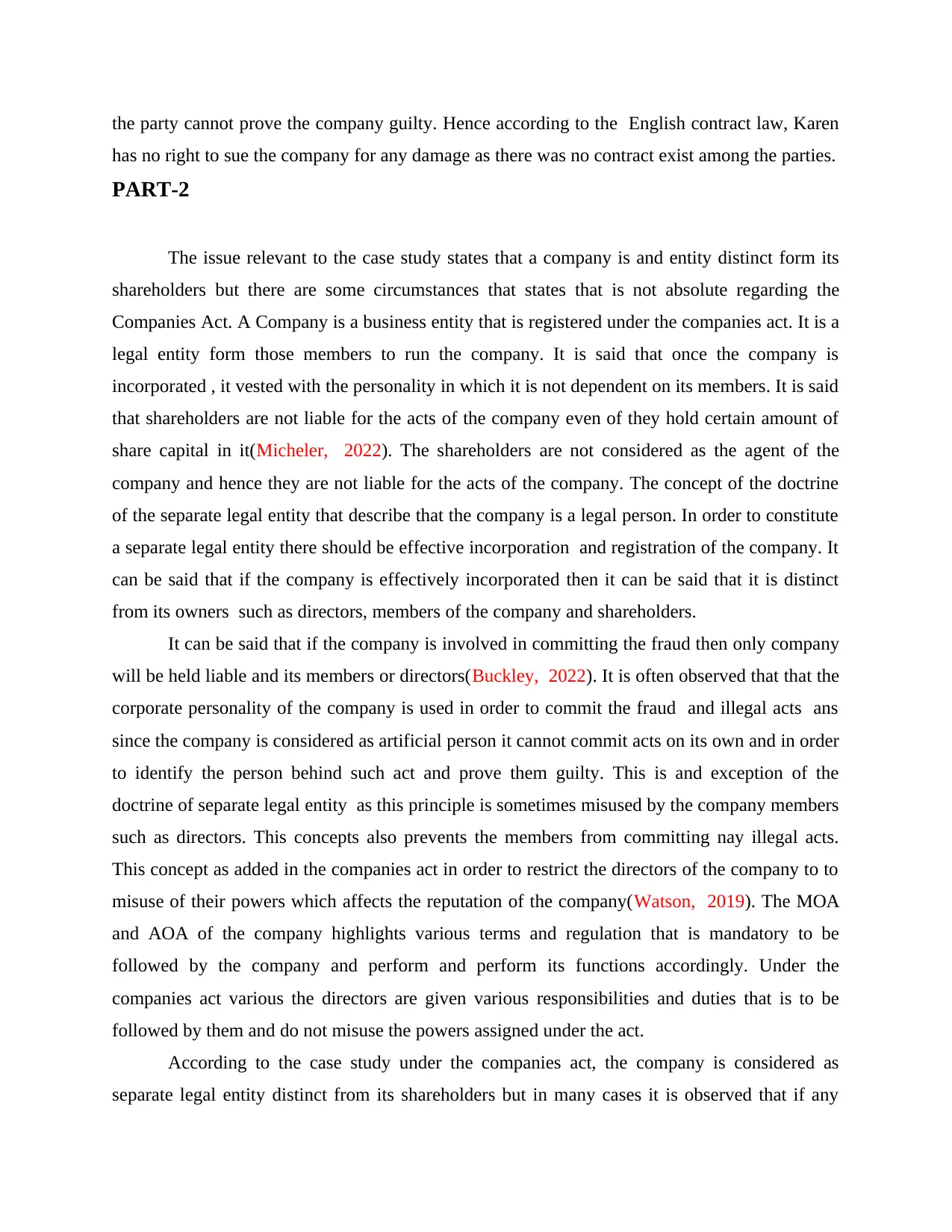
the party cannot prove the company guilty. Hence according to the English contract law, Karen
has no right to sue the company for any damage as there was no contract exist among the parties.
PART-2
The issue relevant to the case study states that a company is and entity distinct form its
shareholders but there are some circumstances that states that is not absolute regarding the
Companies Act. A Company is a business entity that is registered under the companies act. It is a
legal entity form those members to run the company. It is said that once the company is
incorporated , it vested with the personality in which it is not dependent on its members. It is said
that shareholders are not liable for the acts of the company even of they hold certain amount of
share capital in it(Micheler, 2022). The shareholders are not considered as the agent of the
company and hence they are not liable for the acts of the company. The concept of the doctrine
of the separate legal entity that describe that the company is a legal person. In order to constitute
a separate legal entity there should be effective incorporation and registration of the company. It
can be said that if the company is effectively incorporated then it can be said that it is distinct
from its owners such as directors, members of the company and shareholders.
It can be said that if the company is involved in committing the fraud then only company
will be held liable and its members or directors(Buckley, 2022). It is often observed that that the
corporate personality of the company is used in order to commit the fraud and illegal acts ans
since the company is considered as artificial person it cannot commit acts on its own and in order
to identify the person behind such act and prove them guilty. This is and exception of the
doctrine of separate legal entity as this principle is sometimes misused by the company members
such as directors. This concepts also prevents the members from committing nay illegal acts.
This concept as added in the companies act in order to restrict the directors of the company to to
misuse of their powers which affects the reputation of the company(Watson, 2019). The MOA
and AOA of the company highlights various terms and regulation that is mandatory to be
followed by the company and perform and perform its functions accordingly. Under the
companies act various the directors are given various responsibilities and duties that is to be
followed by them and do not misuse the powers assigned under the act.
According to the case study under the companies act, the company is considered as
separate legal entity distinct from its shareholders but in many cases it is observed that if any
has no right to sue the company for any damage as there was no contract exist among the parties.
PART-2
The issue relevant to the case study states that a company is and entity distinct form its
shareholders but there are some circumstances that states that is not absolute regarding the
Companies Act. A Company is a business entity that is registered under the companies act. It is a
legal entity form those members to run the company. It is said that once the company is
incorporated , it vested with the personality in which it is not dependent on its members. It is said
that shareholders are not liable for the acts of the company even of they hold certain amount of
share capital in it(Micheler, 2022). The shareholders are not considered as the agent of the
company and hence they are not liable for the acts of the company. The concept of the doctrine
of the separate legal entity that describe that the company is a legal person. In order to constitute
a separate legal entity there should be effective incorporation and registration of the company. It
can be said that if the company is effectively incorporated then it can be said that it is distinct
from its owners such as directors, members of the company and shareholders.
It can be said that if the company is involved in committing the fraud then only company
will be held liable and its members or directors(Buckley, 2022). It is often observed that that the
corporate personality of the company is used in order to commit the fraud and illegal acts ans
since the company is considered as artificial person it cannot commit acts on its own and in order
to identify the person behind such act and prove them guilty. This is and exception of the
doctrine of separate legal entity as this principle is sometimes misused by the company members
such as directors. This concepts also prevents the members from committing nay illegal acts.
This concept as added in the companies act in order to restrict the directors of the company to to
misuse of their powers which affects the reputation of the company(Watson, 2019). The MOA
and AOA of the company highlights various terms and regulation that is mandatory to be
followed by the company and perform and perform its functions accordingly. Under the
companies act various the directors are given various responsibilities and duties that is to be
followed by them and do not misuse the powers assigned under the act.
According to the case study under the companies act, the company is considered as
separate legal entity distinct from its shareholders but in many cases it is observed that if any
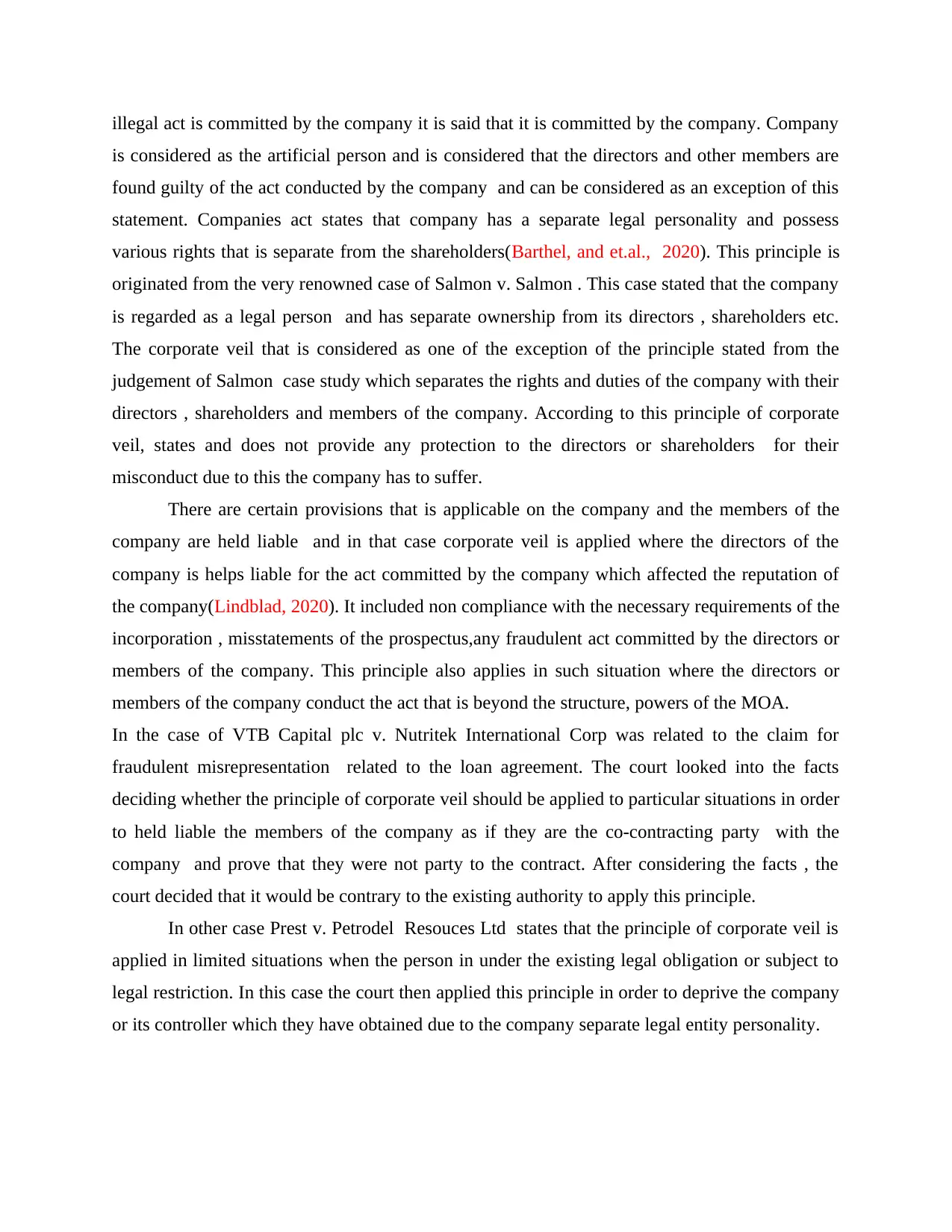
illegal act is committed by the company it is said that it is committed by the company. Company
is considered as the artificial person and is considered that the directors and other members are
found guilty of the act conducted by the company and can be considered as an exception of this
statement. Companies act states that company has a separate legal personality and possess
various rights that is separate from the shareholders(Barthel, and et.al., 2020). This principle is
originated from the very renowned case of Salmon v. Salmon . This case stated that the company
is regarded as a legal person and has separate ownership from its directors , shareholders etc.
The corporate veil that is considered as one of the exception of the principle stated from the
judgement of Salmon case study which separates the rights and duties of the company with their
directors , shareholders and members of the company. According to this principle of corporate
veil, states and does not provide any protection to the directors or shareholders for their
misconduct due to this the company has to suffer.
There are certain provisions that is applicable on the company and the members of the
company are held liable and in that case corporate veil is applied where the directors of the
company is helps liable for the act committed by the company which affected the reputation of
the company(Lindblad, 2020). It included non compliance with the necessary requirements of the
incorporation , misstatements of the prospectus,any fraudulent act committed by the directors or
members of the company. This principle also applies in such situation where the directors or
members of the company conduct the act that is beyond the structure, powers of the MOA.
In the case of VTB Capital plc v. Nutritek International Corp was related to the claim for
fraudulent misrepresentation related to the loan agreement. The court looked into the facts
deciding whether the principle of corporate veil should be applied to particular situations in order
to held liable the members of the company as if they are the co-contracting party with the
company and prove that they were not party to the contract. After considering the facts , the
court decided that it would be contrary to the existing authority to apply this principle.
In other case Prest v. Petrodel Resouces Ltd states that the principle of corporate veil is
applied in limited situations when the person in under the existing legal obligation or subject to
legal restriction. In this case the court then applied this principle in order to deprive the company
or its controller which they have obtained due to the company separate legal entity personality.
is considered as the artificial person and is considered that the directors and other members are
found guilty of the act conducted by the company and can be considered as an exception of this
statement. Companies act states that company has a separate legal personality and possess
various rights that is separate from the shareholders(Barthel, and et.al., 2020). This principle is
originated from the very renowned case of Salmon v. Salmon . This case stated that the company
is regarded as a legal person and has separate ownership from its directors , shareholders etc.
The corporate veil that is considered as one of the exception of the principle stated from the
judgement of Salmon case study which separates the rights and duties of the company with their
directors , shareholders and members of the company. According to this principle of corporate
veil, states and does not provide any protection to the directors or shareholders for their
misconduct due to this the company has to suffer.
There are certain provisions that is applicable on the company and the members of the
company are held liable and in that case corporate veil is applied where the directors of the
company is helps liable for the act committed by the company which affected the reputation of
the company(Lindblad, 2020). It included non compliance with the necessary requirements of the
incorporation , misstatements of the prospectus,any fraudulent act committed by the directors or
members of the company. This principle also applies in such situation where the directors or
members of the company conduct the act that is beyond the structure, powers of the MOA.
In the case of VTB Capital plc v. Nutritek International Corp was related to the claim for
fraudulent misrepresentation related to the loan agreement. The court looked into the facts
deciding whether the principle of corporate veil should be applied to particular situations in order
to held liable the members of the company as if they are the co-contracting party with the
company and prove that they were not party to the contract. After considering the facts , the
court decided that it would be contrary to the existing authority to apply this principle.
In other case Prest v. Petrodel Resouces Ltd states that the principle of corporate veil is
applied in limited situations when the person in under the existing legal obligation or subject to
legal restriction. In this case the court then applied this principle in order to deprive the company
or its controller which they have obtained due to the company separate legal entity personality.
⊘ This is a preview!⊘
Do you want full access?
Subscribe today to unlock all pages.

Trusted by 1+ million students worldwide
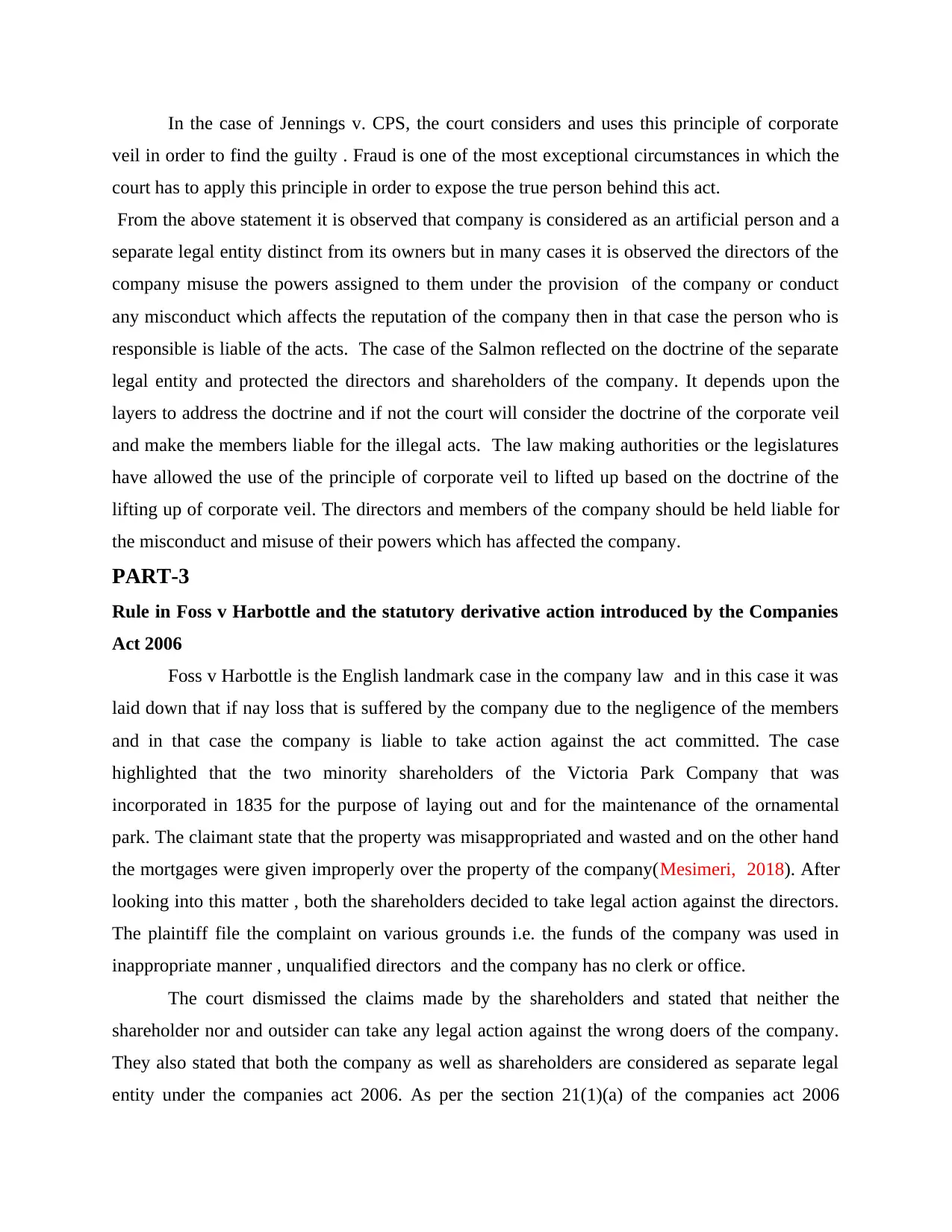
In the case of Jennings v. CPS, the court considers and uses this principle of corporate
veil in order to find the guilty . Fraud is one of the most exceptional circumstances in which the
court has to apply this principle in order to expose the true person behind this act.
From the above statement it is observed that company is considered as an artificial person and a
separate legal entity distinct from its owners but in many cases it is observed the directors of the
company misuse the powers assigned to them under the provision of the company or conduct
any misconduct which affects the reputation of the company then in that case the person who is
responsible is liable of the acts. The case of the Salmon reflected on the doctrine of the separate
legal entity and protected the directors and shareholders of the company. It depends upon the
layers to address the doctrine and if not the court will consider the doctrine of the corporate veil
and make the members liable for the illegal acts. The law making authorities or the legislatures
have allowed the use of the principle of corporate veil to lifted up based on the doctrine of the
lifting up of corporate veil. The directors and members of the company should be held liable for
the misconduct and misuse of their powers which has affected the company.
PART-3
Rule in Foss v Harbottle and the statutory derivative action introduced by the Companies
Act 2006
Foss v Harbottle is the English landmark case in the company law and in this case it was
laid down that if nay loss that is suffered by the company due to the negligence of the members
and in that case the company is liable to take action against the act committed. The case
highlighted that the two minority shareholders of the Victoria Park Company that was
incorporated in 1835 for the purpose of laying out and for the maintenance of the ornamental
park. The claimant state that the property was misappropriated and wasted and on the other hand
the mortgages were given improperly over the property of the company(Mesimeri, 2018). After
looking into this matter , both the shareholders decided to take legal action against the directors.
The plaintiff file the complaint on various grounds i.e. the funds of the company was used in
inappropriate manner , unqualified directors and the company has no clerk or office.
The court dismissed the claims made by the shareholders and stated that neither the
shareholder nor and outsider can take any legal action against the wrong doers of the company.
They also stated that both the company as well as shareholders are considered as separate legal
entity under the companies act 2006. As per the section 21(1)(a) of the companies act 2006
veil in order to find the guilty . Fraud is one of the most exceptional circumstances in which the
court has to apply this principle in order to expose the true person behind this act.
From the above statement it is observed that company is considered as an artificial person and a
separate legal entity distinct from its owners but in many cases it is observed the directors of the
company misuse the powers assigned to them under the provision of the company or conduct
any misconduct which affects the reputation of the company then in that case the person who is
responsible is liable of the acts. The case of the Salmon reflected on the doctrine of the separate
legal entity and protected the directors and shareholders of the company. It depends upon the
layers to address the doctrine and if not the court will consider the doctrine of the corporate veil
and make the members liable for the illegal acts. The law making authorities or the legislatures
have allowed the use of the principle of corporate veil to lifted up based on the doctrine of the
lifting up of corporate veil. The directors and members of the company should be held liable for
the misconduct and misuse of their powers which has affected the company.
PART-3
Rule in Foss v Harbottle and the statutory derivative action introduced by the Companies
Act 2006
Foss v Harbottle is the English landmark case in the company law and in this case it was
laid down that if nay loss that is suffered by the company due to the negligence of the members
and in that case the company is liable to take action against the act committed. The case
highlighted that the two minority shareholders of the Victoria Park Company that was
incorporated in 1835 for the purpose of laying out and for the maintenance of the ornamental
park. The claimant state that the property was misappropriated and wasted and on the other hand
the mortgages were given improperly over the property of the company(Mesimeri, 2018). After
looking into this matter , both the shareholders decided to take legal action against the directors.
The plaintiff file the complaint on various grounds i.e. the funds of the company was used in
inappropriate manner , unqualified directors and the company has no clerk or office.
The court dismissed the claims made by the shareholders and stated that neither the
shareholder nor and outsider can take any legal action against the wrong doers of the company.
They also stated that both the company as well as shareholders are considered as separate legal
entity under the companies act 2006. As per the section 21(1)(a) of the companies act 2006
Paraphrase This Document
Need a fresh take? Get an instant paraphrase of this document with our AI Paraphraser
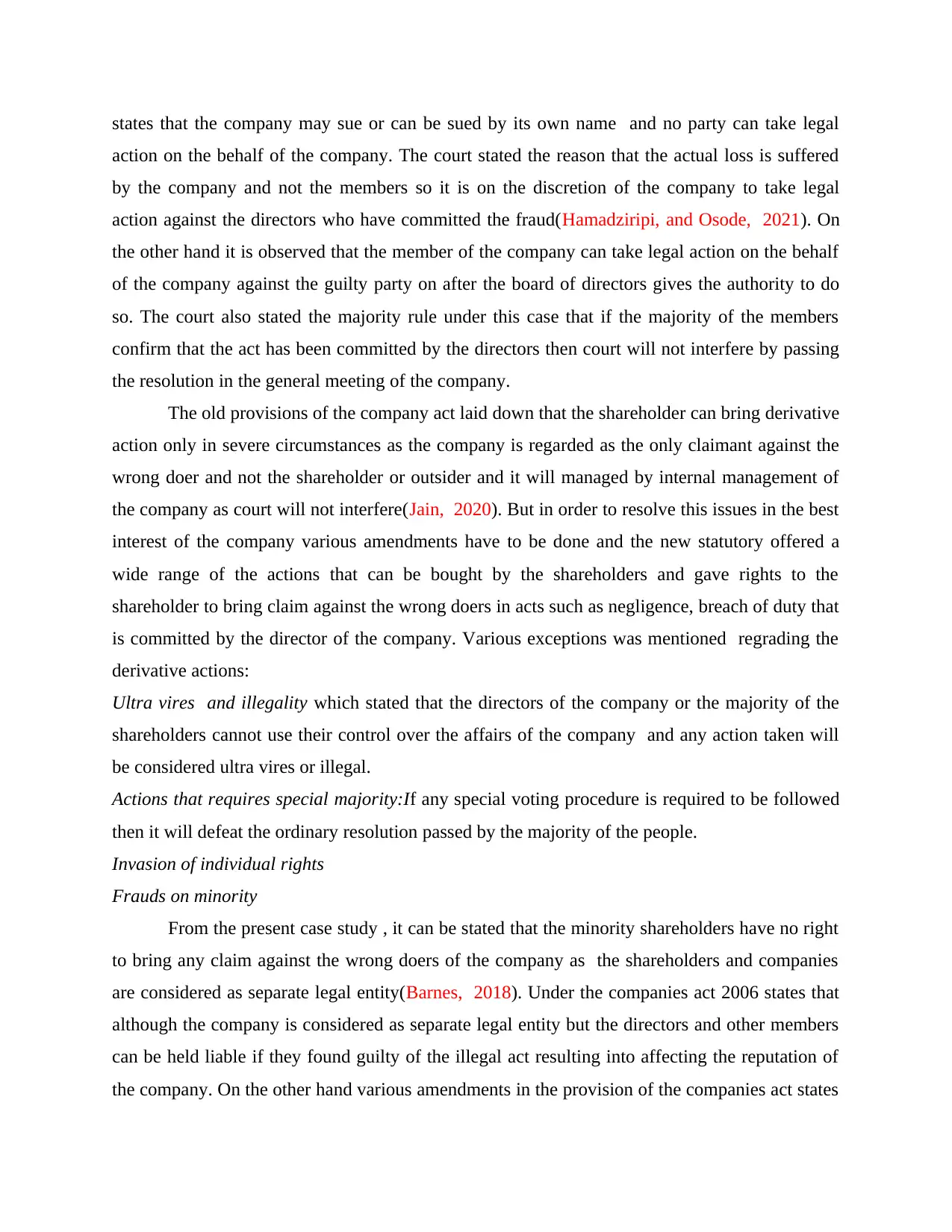
states that the company may sue or can be sued by its own name and no party can take legal
action on the behalf of the company. The court stated the reason that the actual loss is suffered
by the company and not the members so it is on the discretion of the company to take legal
action against the directors who have committed the fraud(Hamadziripi, and Osode, 2021). On
the other hand it is observed that the member of the company can take legal action on the behalf
of the company against the guilty party on after the board of directors gives the authority to do
so. The court also stated the majority rule under this case that if the majority of the members
confirm that the act has been committed by the directors then court will not interfere by passing
the resolution in the general meeting of the company.
The old provisions of the company act laid down that the shareholder can bring derivative
action only in severe circumstances as the company is regarded as the only claimant against the
wrong doer and not the shareholder or outsider and it will managed by internal management of
the company as court will not interfere(Jain, 2020). But in order to resolve this issues in the best
interest of the company various amendments have to be done and the new statutory offered a
wide range of the actions that can be bought by the shareholders and gave rights to the
shareholder to bring claim against the wrong doers in acts such as negligence, breach of duty that
is committed by the director of the company. Various exceptions was mentioned regrading the
derivative actions:
Ultra vires and illegality which stated that the directors of the company or the majority of the
shareholders cannot use their control over the affairs of the company and any action taken will
be considered ultra vires or illegal.
Actions that requires special majority:If any special voting procedure is required to be followed
then it will defeat the ordinary resolution passed by the majority of the people.
Invasion of individual rights
Frauds on minority
From the present case study , it can be stated that the minority shareholders have no right
to bring any claim against the wrong doers of the company as the shareholders and companies
are considered as separate legal entity(Barnes, 2018). Under the companies act 2006 states that
although the company is considered as separate legal entity but the directors and other members
can be held liable if they found guilty of the illegal act resulting into affecting the reputation of
the company. On the other hand various amendments in the provision of the companies act states
action on the behalf of the company. The court stated the reason that the actual loss is suffered
by the company and not the members so it is on the discretion of the company to take legal
action against the directors who have committed the fraud(Hamadziripi, and Osode, 2021). On
the other hand it is observed that the member of the company can take legal action on the behalf
of the company against the guilty party on after the board of directors gives the authority to do
so. The court also stated the majority rule under this case that if the majority of the members
confirm that the act has been committed by the directors then court will not interfere by passing
the resolution in the general meeting of the company.
The old provisions of the company act laid down that the shareholder can bring derivative
action only in severe circumstances as the company is regarded as the only claimant against the
wrong doer and not the shareholder or outsider and it will managed by internal management of
the company as court will not interfere(Jain, 2020). But in order to resolve this issues in the best
interest of the company various amendments have to be done and the new statutory offered a
wide range of the actions that can be bought by the shareholders and gave rights to the
shareholder to bring claim against the wrong doers in acts such as negligence, breach of duty that
is committed by the director of the company. Various exceptions was mentioned regrading the
derivative actions:
Ultra vires and illegality which stated that the directors of the company or the majority of the
shareholders cannot use their control over the affairs of the company and any action taken will
be considered ultra vires or illegal.
Actions that requires special majority:If any special voting procedure is required to be followed
then it will defeat the ordinary resolution passed by the majority of the people.
Invasion of individual rights
Frauds on minority
From the present case study , it can be stated that the minority shareholders have no right
to bring any claim against the wrong doers of the company as the shareholders and companies
are considered as separate legal entity(Barnes, 2018). Under the companies act 2006 states that
although the company is considered as separate legal entity but the directors and other members
can be held liable if they found guilty of the illegal act resulting into affecting the reputation of
the company. On the other hand various amendments in the provision of the companies act states
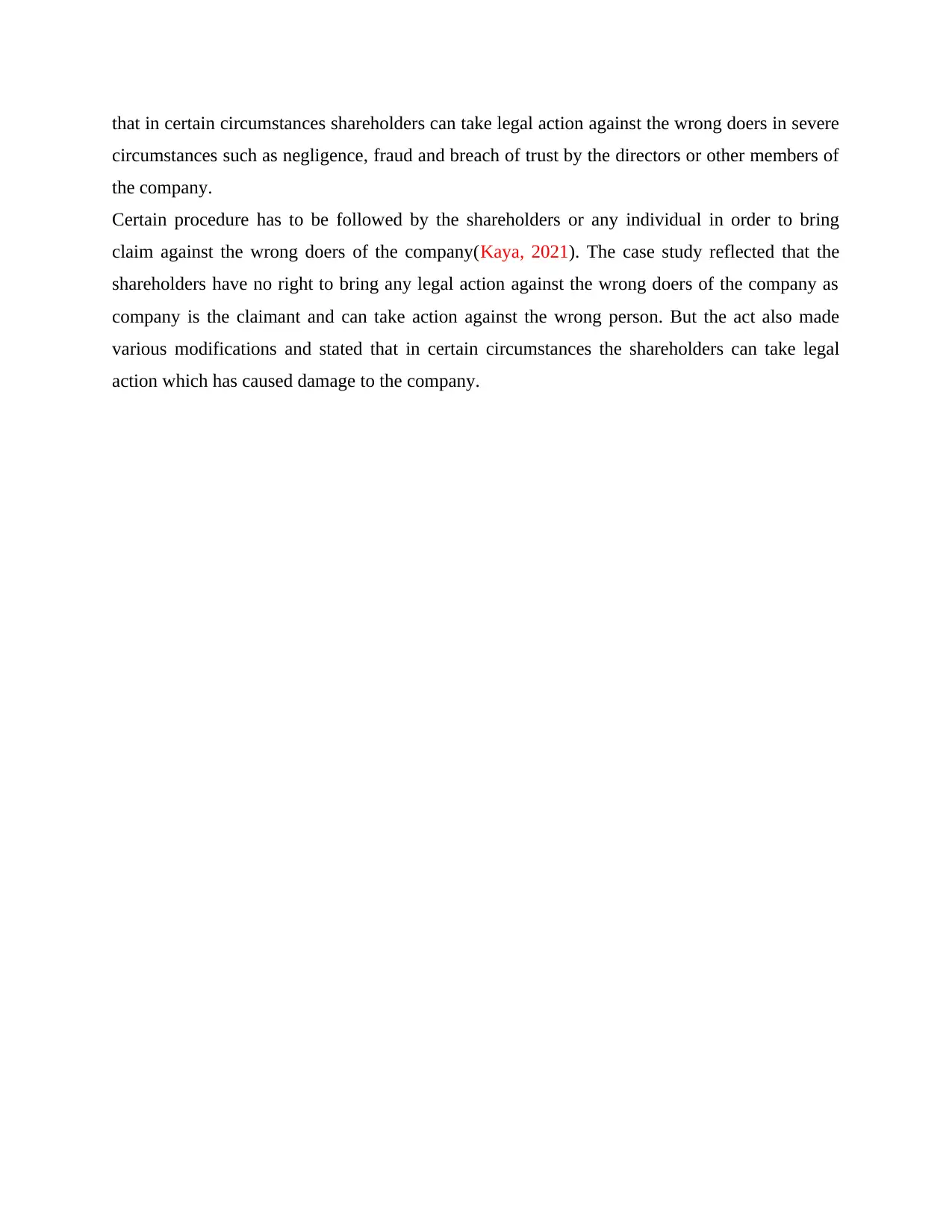
that in certain circumstances shareholders can take legal action against the wrong doers in severe
circumstances such as negligence, fraud and breach of trust by the directors or other members of
the company.
Certain procedure has to be followed by the shareholders or any individual in order to bring
claim against the wrong doers of the company(Kaya, 2021). The case study reflected that the
shareholders have no right to bring any legal action against the wrong doers of the company as
company is the claimant and can take action against the wrong person. But the act also made
various modifications and stated that in certain circumstances the shareholders can take legal
action which has caused damage to the company.
circumstances such as negligence, fraud and breach of trust by the directors or other members of
the company.
Certain procedure has to be followed by the shareholders or any individual in order to bring
claim against the wrong doers of the company(Kaya, 2021). The case study reflected that the
shareholders have no right to bring any legal action against the wrong doers of the company as
company is the claimant and can take action against the wrong person. But the act also made
various modifications and stated that in certain circumstances the shareholders can take legal
action which has caused damage to the company.
⊘ This is a preview!⊘
Do you want full access?
Subscribe today to unlock all pages.

Trusted by 1+ million students worldwide
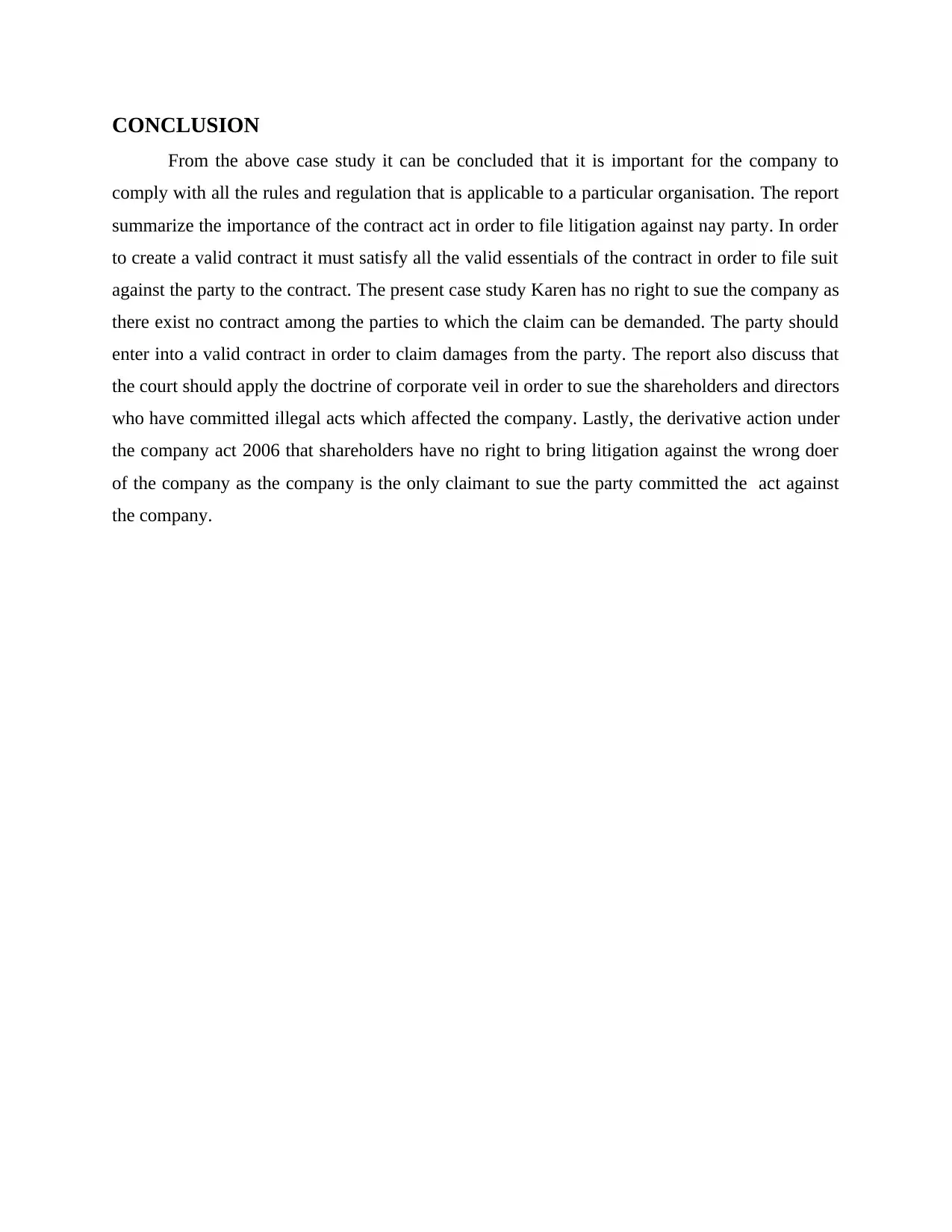
CONCLUSION
From the above case study it can be concluded that it is important for the company to
comply with all the rules and regulation that is applicable to a particular organisation. The report
summarize the importance of the contract act in order to file litigation against nay party. In order
to create a valid contract it must satisfy all the valid essentials of the contract in order to file suit
against the party to the contract. The present case study Karen has no right to sue the company as
there exist no contract among the parties to which the claim can be demanded. The party should
enter into a valid contract in order to claim damages from the party. The report also discuss that
the court should apply the doctrine of corporate veil in order to sue the shareholders and directors
who have committed illegal acts which affected the company. Lastly, the derivative action under
the company act 2006 that shareholders have no right to bring litigation against the wrong doer
of the company as the company is the only claimant to sue the party committed the act against
the company.
From the above case study it can be concluded that it is important for the company to
comply with all the rules and regulation that is applicable to a particular organisation. The report
summarize the importance of the contract act in order to file litigation against nay party. In order
to create a valid contract it must satisfy all the valid essentials of the contract in order to file suit
against the party to the contract. The present case study Karen has no right to sue the company as
there exist no contract among the parties to which the claim can be demanded. The party should
enter into a valid contract in order to claim damages from the party. The report also discuss that
the court should apply the doctrine of corporate veil in order to sue the shareholders and directors
who have committed illegal acts which affected the company. Lastly, the derivative action under
the company act 2006 that shareholders have no right to bring litigation against the wrong doer
of the company as the company is the only claimant to sue the party committed the act against
the company.
Paraphrase This Document
Need a fresh take? Get an instant paraphrase of this document with our AI Paraphraser
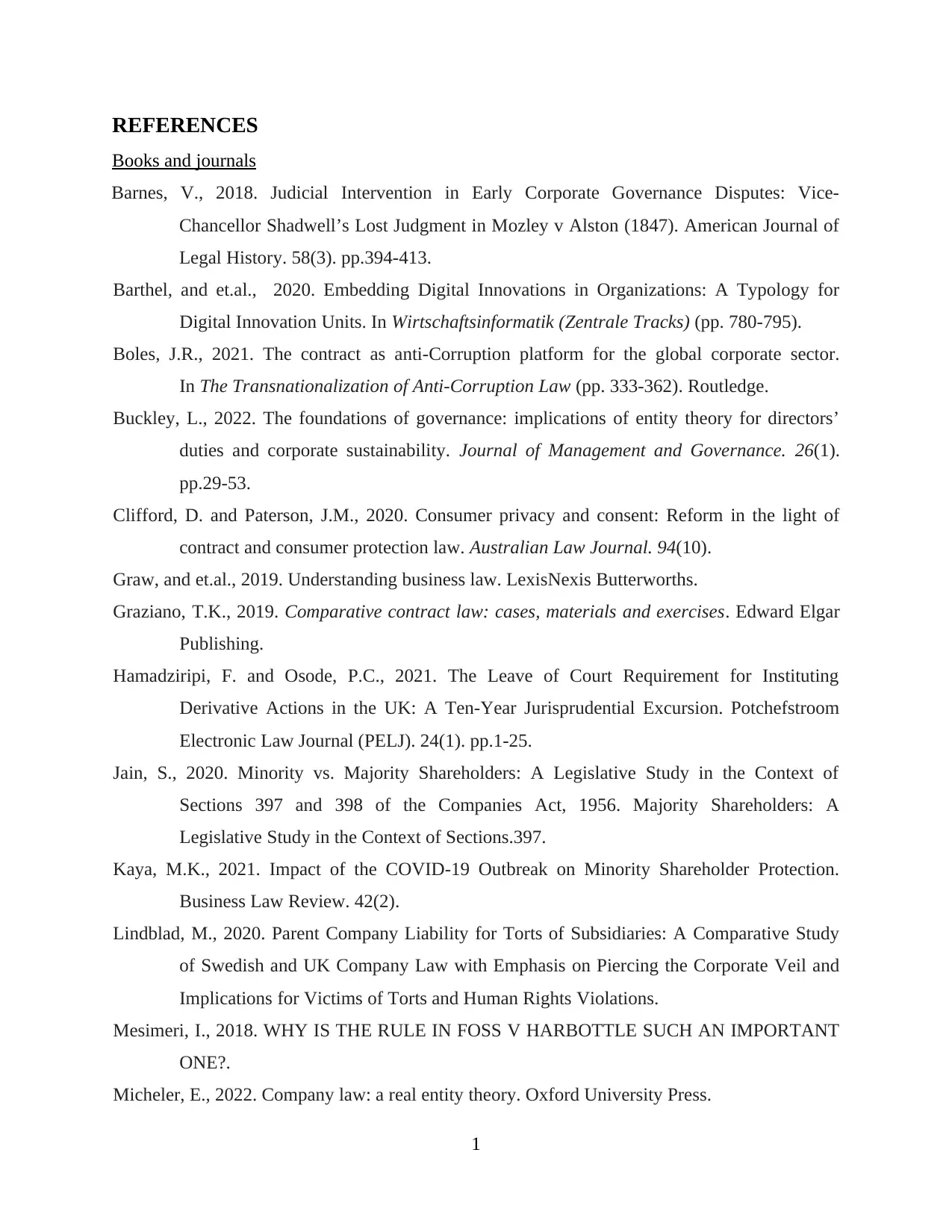
REFERENCES
Books and journals
Barnes, V., 2018. Judicial Intervention in Early Corporate Governance Disputes: Vice-
Chancellor Shadwell’s Lost Judgment in Mozley v Alston (1847). American Journal of
Legal History. 58(3). pp.394-413.
Barthel, and et.al., 2020. Embedding Digital Innovations in Organizations: A Typology for
Digital Innovation Units. In Wirtschaftsinformatik (Zentrale Tracks) (pp. 780-795).
Boles, J.R., 2021. The contract as anti-Corruption platform for the global corporate sector.
In The Transnationalization of Anti-Corruption Law (pp. 333-362). Routledge.
Buckley, L., 2022. The foundations of governance: implications of entity theory for directors’
duties and corporate sustainability. Journal of Management and Governance. 26(1).
pp.29-53.
Clifford, D. and Paterson, J.M., 2020. Consumer privacy and consent: Reform in the light of
contract and consumer protection law. Australian Law Journal. 94(10).
Graw, and et.al., 2019. Understanding business law. LexisNexis Butterworths.
Graziano, T.K., 2019. Comparative contract law: cases, materials and exercises. Edward Elgar
Publishing.
Hamadziripi, F. and Osode, P.C., 2021. The Leave of Court Requirement for Instituting
Derivative Actions in the UK: A Ten-Year Jurisprudential Excursion. Potchefstroom
Electronic Law Journal (PELJ). 24(1). pp.1-25.
Jain, S., 2020. Minority vs. Majority Shareholders: A Legislative Study in the Context of
Sections 397 and 398 of the Companies Act, 1956. Majority Shareholders: A
Legislative Study in the Context of Sections.397.
Kaya, M.K., 2021. Impact of the COVID-19 Outbreak on Minority Shareholder Protection.
Business Law Review. 42(2).
Lindblad, M., 2020. Parent Company Liability for Torts of Subsidiaries: A Comparative Study
of Swedish and UK Company Law with Emphasis on Piercing the Corporate Veil and
Implications for Victims of Torts and Human Rights Violations.
Mesimeri, I., 2018. WHY IS THE RULE IN FOSS V HARBOTTLE SUCH AN IMPORTANT
ONE?.
Micheler, E., 2022. Company law: a real entity theory. Oxford University Press.
1
Books and journals
Barnes, V., 2018. Judicial Intervention in Early Corporate Governance Disputes: Vice-
Chancellor Shadwell’s Lost Judgment in Mozley v Alston (1847). American Journal of
Legal History. 58(3). pp.394-413.
Barthel, and et.al., 2020. Embedding Digital Innovations in Organizations: A Typology for
Digital Innovation Units. In Wirtschaftsinformatik (Zentrale Tracks) (pp. 780-795).
Boles, J.R., 2021. The contract as anti-Corruption platform for the global corporate sector.
In The Transnationalization of Anti-Corruption Law (pp. 333-362). Routledge.
Buckley, L., 2022. The foundations of governance: implications of entity theory for directors’
duties and corporate sustainability. Journal of Management and Governance. 26(1).
pp.29-53.
Clifford, D. and Paterson, J.M., 2020. Consumer privacy and consent: Reform in the light of
contract and consumer protection law. Australian Law Journal. 94(10).
Graw, and et.al., 2019. Understanding business law. LexisNexis Butterworths.
Graziano, T.K., 2019. Comparative contract law: cases, materials and exercises. Edward Elgar
Publishing.
Hamadziripi, F. and Osode, P.C., 2021. The Leave of Court Requirement for Instituting
Derivative Actions in the UK: A Ten-Year Jurisprudential Excursion. Potchefstroom
Electronic Law Journal (PELJ). 24(1). pp.1-25.
Jain, S., 2020. Minority vs. Majority Shareholders: A Legislative Study in the Context of
Sections 397 and 398 of the Companies Act, 1956. Majority Shareholders: A
Legislative Study in the Context of Sections.397.
Kaya, M.K., 2021. Impact of the COVID-19 Outbreak on Minority Shareholder Protection.
Business Law Review. 42(2).
Lindblad, M., 2020. Parent Company Liability for Torts of Subsidiaries: A Comparative Study
of Swedish and UK Company Law with Emphasis on Piercing the Corporate Veil and
Implications for Victims of Torts and Human Rights Violations.
Mesimeri, I., 2018. WHY IS THE RULE IN FOSS V HARBOTTLE SUCH AN IMPORTANT
ONE?.
Micheler, E., 2022. Company law: a real entity theory. Oxford University Press.
1
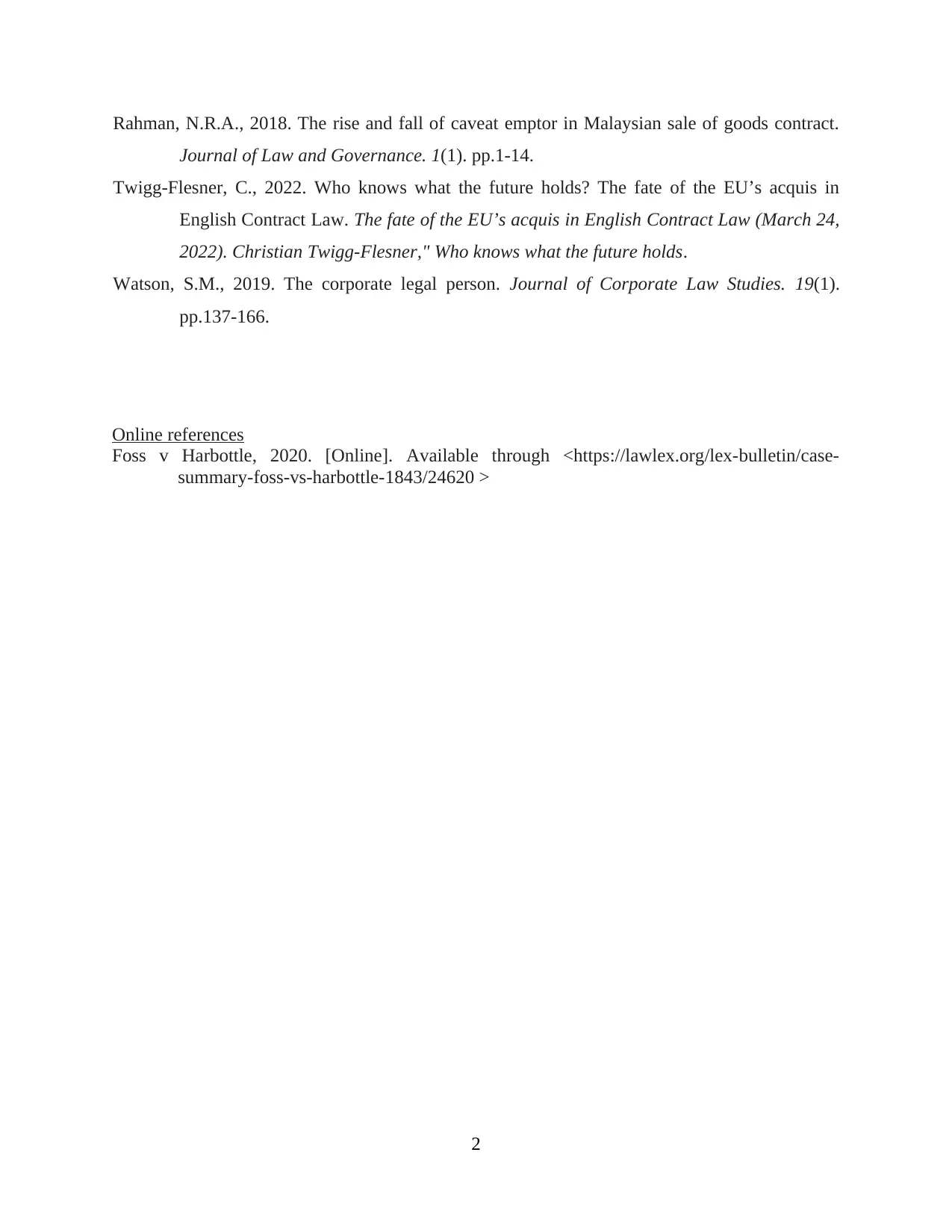
Rahman, N.R.A., 2018. The rise and fall of caveat emptor in Malaysian sale of goods contract.
Journal of Law and Governance. 1(1). pp.1-14.
Twigg-Flesner, C., 2022. Who knows what the future holds? The fate of the EU’s acquis in
English Contract Law. The fate of the EU’s acquis in English Contract Law (March 24,
2022). Christian Twigg-Flesner," Who knows what the future holds.
Watson, S.M., 2019. The corporate legal person. Journal of Corporate Law Studies. 19(1).
pp.137-166.
Online references
Foss v Harbottle, 2020. [Online]. Available through <https://lawlex.org/lex-bulletin/case-
summary-foss-vs-harbottle-1843/24620 >
2
Journal of Law and Governance. 1(1). pp.1-14.
Twigg-Flesner, C., 2022. Who knows what the future holds? The fate of the EU’s acquis in
English Contract Law. The fate of the EU’s acquis in English Contract Law (March 24,
2022). Christian Twigg-Flesner," Who knows what the future holds.
Watson, S.M., 2019. The corporate legal person. Journal of Corporate Law Studies. 19(1).
pp.137-166.
Online references
Foss v Harbottle, 2020. [Online]. Available through <https://lawlex.org/lex-bulletin/case-
summary-foss-vs-harbottle-1843/24620 >
2
⊘ This is a preview!⊘
Do you want full access?
Subscribe today to unlock all pages.

Trusted by 1+ million students worldwide
1 out of 12
Related Documents
Your All-in-One AI-Powered Toolkit for Academic Success.
+13062052269
info@desklib.com
Available 24*7 on WhatsApp / Email
![[object Object]](/_next/static/media/star-bottom.7253800d.svg)
Unlock your academic potential
Copyright © 2020–2025 A2Z Services. All Rights Reserved. Developed and managed by ZUCOL.




